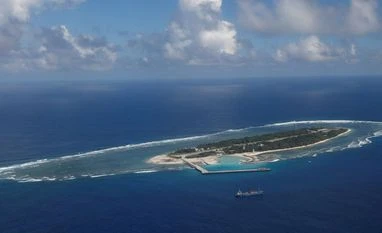A US aircraft carrier strike group has begun patrolling in the disputed South China Sea despite China's warning to America against challenging its sovereignty in the area.
The US Navy's Carrier Strike Group (CSG) 1, an operational formation of the United States Navy, began routine operations in the South China Sea on February 18, the Pentagon said.
"We are looking forward to demonstrating those capabilities while building upon existing strong relationships with our allies, partners and friends in the Indo-Asia-Pacific region," said Rear Adm James Kilby, commander, CSG 1.
CVW-2 includes the "Black Knights" of Helicopter Sea Combat Squadron, the "Blue Hawks" of Helicopter Maritime Strike Squadron, the "Bounty Hunters" of Strike Fighter Squadron, the "Blue Blasters" of VFA-34, the "Kestrels" of VFA-137, the "Golden Dragons" of VFA-192, the "Black Eagles" of Carrier Airborne Early Warning Squadron (VAW) 113, the "Gauntlets" of Electronic Attack Squadron (VAQ) 136 and the "Providers" of Fleet Logistic Support Squadron.
China has a long history of maritime disputes with its South China Sea neighbours.
China claims almost all of the South China Sea, including islands more than 800 miles from the Chinese mainland, despite objections from neighbours such as the Philippines, Malaysia, Brunei and Vietnam.
Beijing has also created artificial islands in the area, outfitting some of them with military features.
Friction between the US and China over trade and territory under US President Donald Trump have increased concerns that the South China Sea could become a flashpoint.
China's Foreign Ministry on Wednesday warned the US against challenging its sovereignty over reports the US was planning fresh naval patrols in the disputed South China Sea.
Chinese Foreign Ministry spokesman Geng Shuang said tension in the South China Sea had stabilised due to the hard work between China and Southeast Asia countries, and urged foreign nations including the US to respect this.
"We urge the US not to take any actions that challenge China's sovereignty and security," Geng had said.
Prior to their operations in the South China Sea, ships and aircraft from within the strike group conducted training off the islands of Hawaii and Guam to maintain and improve their readiness and develop cohesion as a strike group, the statement said.
While deployed, the Carl Vinson CSG will remain under US 3rd Fleet command and control, including beyond the international dateline, which previously divided operational areas of responsibility for 3rd and 7th Fleets.
Third Fleet operating forward offers additional options to the Pacific Fleet commander by leveraging the capabilities of 3rd and 7th Fleets.
"This operational concept allows both numbered fleets to complement one another and provide the foundation of stability in the Indo-Asia-Pacific region," the Pentagon said.
The US Navy's Carrier Strike Group (CSG) 1, an operational formation of the United States Navy, began routine operations in the South China Sea on February 18, the Pentagon said.
"We are looking forward to demonstrating those capabilities while building upon existing strong relationships with our allies, partners and friends in the Indo-Asia-Pacific region," said Rear Adm James Kilby, commander, CSG 1.
More From This Section
Carrier Strike Group (CSG) 1, the naval formation in its current shape established in 2009 includes Nimitz-class aircraft carrier USS Carl Vinson, Destroyer Squadron 1's Arleigh Burke-class guided-missile destroyer USS Wayne E Meyer, and aircraft from Carrier Air Wing (CVW) 2.
CVW-2 includes the "Black Knights" of Helicopter Sea Combat Squadron, the "Blue Hawks" of Helicopter Maritime Strike Squadron, the "Bounty Hunters" of Strike Fighter Squadron, the "Blue Blasters" of VFA-34, the "Kestrels" of VFA-137, the "Golden Dragons" of VFA-192, the "Black Eagles" of Carrier Airborne Early Warning Squadron (VAW) 113, the "Gauntlets" of Electronic Attack Squadron (VAQ) 136 and the "Providers" of Fleet Logistic Support Squadron.
China has a long history of maritime disputes with its South China Sea neighbours.
China claims almost all of the South China Sea, including islands more than 800 miles from the Chinese mainland, despite objections from neighbours such as the Philippines, Malaysia, Brunei and Vietnam.
Beijing has also created artificial islands in the area, outfitting some of them with military features.
Friction between the US and China over trade and territory under US President Donald Trump have increased concerns that the South China Sea could become a flashpoint.
China's Foreign Ministry on Wednesday warned the US against challenging its sovereignty over reports the US was planning fresh naval patrols in the disputed South China Sea.
Chinese Foreign Ministry spokesman Geng Shuang said tension in the South China Sea had stabilised due to the hard work between China and Southeast Asia countries, and urged foreign nations including the US to respect this.
"We urge the US not to take any actions that challenge China's sovereignty and security," Geng had said.
Prior to their operations in the South China Sea, ships and aircraft from within the strike group conducted training off the islands of Hawaii and Guam to maintain and improve their readiness and develop cohesion as a strike group, the statement said.
While deployed, the Carl Vinson CSG will remain under US 3rd Fleet command and control, including beyond the international dateline, which previously divided operational areas of responsibility for 3rd and 7th Fleets.
Third Fleet operating forward offers additional options to the Pacific Fleet commander by leveraging the capabilities of 3rd and 7th Fleets.
"This operational concept allows both numbered fleets to complement one another and provide the foundation of stability in the Indo-Asia-Pacific region," the Pentagon said.
)